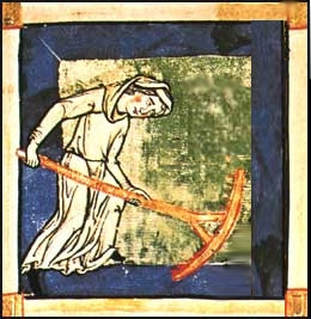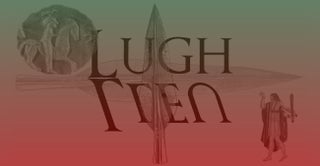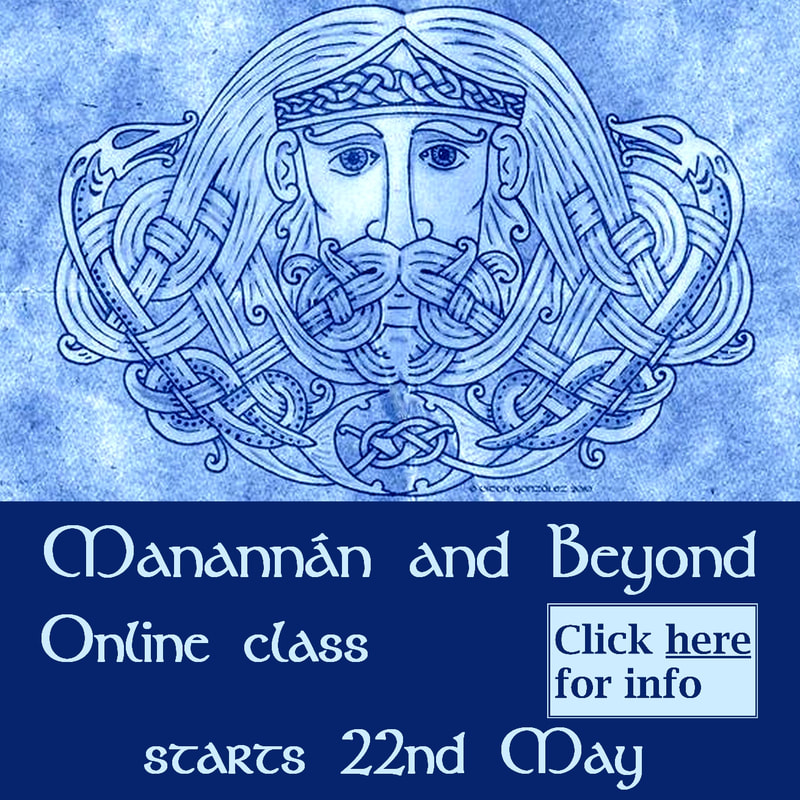| The Irish name for Lammas is Lughnasadh (or Lunastal in Scottish Gaelic). This refers to the funerary games which we are told the god Lugh initiated to honour his foster mother, Tailtiu, who died after the labour of clearing the land around Telltown, County Meath, for agriculture. Telltown is said to take its name from Tailtiu, and gives its own name to Lammas fair customs like Telltown marriages, which were year-and-a-day trial marriages performed at fairs. Another tradition was that of young people agreeing to be sweethearts just for the duration of the fair period. These couples were then referred to as being Telltown brother and sister. Since the quarter days were important in the Scottish legal calendar as starting and ending dates for legal contracts, it's natural that these informal romantic contracts would be struck at this time. More generally, both folklore and neo-Pagan lore at this time of year is full of harvest customs, corn maidens, and fancy loaves of bread. Increasingly, I'm feeling a bit disaffected when it comes to this. The more I study human history, and the more I look at the mess our human sprawl has made of our home (planet Earth), the more I begin to regret that the human race chose to take up the plough in the first place. The taming of grain allowed humans to settle down and raise more children, who in turn raised even more children. All those children who grew up and needed more land to clear, conquer and plough for ever bigger fields of grain, and so the dominos began to topple. Forests, wildlife, indigenous people -- all stood in the way of this process we called progress. The progress that enabled us to build cities and sit still long enough to create the industrial revolution and the population explosion, which in turn influenced the tendency to factory farming and vast, destructive monoculture grain plantations. Although I know we will never intentionally turn the clock back as far as I might wish, there is a part of me that feels reluctant to celebrate what my ancestors started. I've spent most of my life living in agricultural communities. It's not a distant, hazy dream for me. I understand its cycles of arable and stock rearing tasks and celebrations. I also love the deities of the Celts. They are my own deities, and many of them are deeply bound up with agriculture, as is our neo-Pagan wheel of the year. I'm not going to throw that away. For one thing, it's reality. I still like to eat. I like to drink beer and whisky. Throwing John Barleycorn and The Corn Maiden out with the irrigation water seems a little ungrateful. However, at the same time I trust that the reasons for my current feelings are also valid, and like my ancestors before me, I'm not afraid to begin to look at things through a new lens, and place more weight on what is important now. And right now, preserving the unploughed natural world is more important to me than whether me and my tribe have enough to eat over the winter. Lugh, we know, was not only a successful and clever warrior, but was known for his many skills. Skill at crafts and music, at gaming and healing. After the second battle of Magh Tiuragh he and his wise men refused the offer of four grain harvests per year and cows that gave milk perpetually. Gifts offered by Bres, the defeated king who had taxed and worked his people into utter misery. This may have been Bres' idea of a good thing, but to the Tuatha De Danann is was unsuitable. They preferred to keep everything in its natural season. Tailtiu, meanwhile, died in bondage after clearing the land for agriculture. I think it has long been the general assumption that she is honoured for having made a great sacrifice, and that is a reasonable reading of the myth, especially in a wider context. However, I see her also as representing the land put under the bondage of the plough, and of the loss of the hunting grounds which were destroyed in the process. What will I be thinking of at Lughnasadh rituals this year? I'm not sure yet, but I have plenty to be going forward with. The making of experimental or short-term agreements, considering how best to use my skills, honouring the natural cycles of nature and not asking her to work overtime on my behalf, and supporting animal rights and wild nature. I will also be thankful and mindful of where and how my next bowl of porridge and bottle of beer will make their way to me. | Tailltiu daughter of Mag Mor king of Spain, queen of the Fir Bolg, came after the slaughter was inflicted upon the Fir Bolg in that first battle of Mag Tuired to Coill Cuan: and the wood was cut down by her, so it was a plain under clover-flower before the end of a year. This is that Tailtiu who was wife of Eochu son of Erc king of Ireland till the Tuatha De Danann slew him, ut praediximus: it is he who took her from her father, from Spain; and it is she who slept with Eochu Garb son of Dui Dall of the Tuatha De Danann; and Cian son of Dian Cecht, whose other name was Scal Balb, gave her his son in fosterage, namely Lugh, whose mother was Eithne daughter of Balar. So Tailltiu died in Tailltiu, and her name clave thereto and her grave is from the Seat of Tailltiu north-eastward. Her games were performed every year and her song of lamentation, by Lugh. With gessa and feats of arms were they performed, a fortnight before Lugnasad and a fortnight after: under dicitur Lughnasadh, that is, the celebration or the festival of Lugh. Lebor Gabala Erenn - R.A.S.MacAlister, traslator. _________________________ Taltiu, daughter of gentle Magmor, wife of Eochu Garb son of Dui Dall, came hither leading the Fir Bolg host to Caill Chuan, after high battle. Caill Chuan, it was a thicket of trees from Escir to Ath Drommann, from the Great Bog, a long journey, from the Sele to Ard Assuide. Assuide, the seat of the hunt, whither gathered the red-coated deer; often was the bugle first sounded east of the wood, the second time on the edge of Clochar. Commur, Currech, Crích Linde, Ard Manai where the spears used to be; the hounds of Cairpre killed their quarry on the land of Tipra Mungairde. Great that deed that was done with the axe's help by Taltiu, the reclaiming of meadowland from the even wood by Taltiu daughter of Magmor. When the fair wood was cut down by her, roots and all, out of the ground, before the year's end it became Bregmag, it became a plain blossoming with clover. Her heart burst in her body from the strain beneath her royal vest; not wholesome, truly, is a face like the coal, for the sake of woods or pride of timber. Long was the sorrow, long the weariness of Tailtiu, in sickness after heavy toil; the men of the island of Erin to whom she was in bondage came to receive her last behest. She told them in her sickness (feeble she was but not speechless) that they should hold funeral games to lament her—zealous the deed. About the Calends of August she died, on a Monday, on the Lugnasad of Lug; round her grave from that Monday forth is held the chief Fair of noble Erin. White-sided Tailtiu uttered in her land a true prophecy, that so long as every prince should accept her, Erin should not be without perfect song. A fair with gold, with silver, with games, with music of chariots, with adornment of body and of soul by means of knowledge and eloquence. A fair without wounding or robbing of any man, without trouble, without dispute, without reaving, without challenge of property, without suing, without law-sessions, without evasion, without arrest. A fair without sin, without fraud, without reproach, without insult, without contention, without seizure, without theft, without redemption: No man going into the seats of the women, nor woman into the seats of the men, shining fair, but each in due order by rank in his place in the high Fair. Unbroken truce of the fair the while through Erin and Alba alike, while men went in and came out without any rude hostility. Metrical Dindshenchas - Edward Gwynn, translator ________________________ "The cows of Ireland will always be in milk," said Bres, "if I am spared." "I will tell that to our wise men," said Lug. So Lug went to Maeltne Morbrethach and said to him, "Shall Bres be spared for giving constant milk to the cows of Ireland?" "He shall not be spared," said Maeltne. "He has no power over their age or their calving, even if he controls their milk as long as they are alive." Lug said to Bres, "That does not save you; you have no power over their age or their calving, even if you control their milk. Is there anything else which will save you, Bres?" said Lug. "There is indeed. Tell your lawyer they will reap a harvest every quarter in return for sparing me." Lug said to Maeltne, "Shall Bres be spared for giving the men of Ireland a harvest of grain every quarter?" "This has suited us," said Maeltne. "Spring for plowing and sowing, and the beginning of summer for maturing the strength of the grain, and the beginning of autumn for the full ripeness of the grain, and for reaping it. Winter for consuming it." The Second Battle of Mag Tuired - Elizabeth A Gray, translator |
|
As most Pagans know, both Lammas and Lughnasadh are associated with grain. Lammas comes from the Anglo-Saxon "loaf mass" - a time when the first loaves made from the new wheat crop were taken to the church and blessed. The season of Lammastide had, and still has, all sorts of grain harvest customs associated with it. I remember when I moved to Scotland in the 1980s being amazed to see "Lammas (Scottish quarter day)" printed on the appropriate date, in the appointment diary I bought. The Lammas fairs of Scotland were once major points in the agricultural calendar. With the grain harvest in, it was a good time for agricultural workers who didn't like their current positions to look to "fee" with a different farmer, and Lammas fairs became important hiring fairs. It's not unusual, even now, to hear older people say "It's like a Lammas fair!" when a place is unusually crowded or busy.
0 Comments
Leave a Reply. |
Archives
March 2023
Categories
All
Blogroll |



 RSS Feed
RSS Feed




